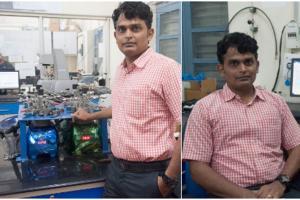IIT Madras researchers are studying the efficacy of an emerging enhanced oil recovery method called 'Low-Salinity Enhanced Oil Recovery'

Pic/Twitter
Researchers at the Indian Institute of Technology (IIT), Madras are developing indigenous processes for efficient recovery of oil from mature offshore wells.
ADVERTISEMENT
In collaboration with research laboratories in Australia, IIT Madras researchers are studying the efficacy of an emerging enhanced oil recovery method called 'Low-Salinity Enhanced Oil Recovery' (LSEOR).
@iitmadras researchers develop indigenous processes for recovery of oil from mature offshore wells in India@IndiaDST has approved fiscal incentives to enhance oil & gas recovery from ageing & new fields, which can potentially raise production of oil by 120 million tonnes pic.twitter.com/NGAnbrr04w
— IIT Madras (@iitmadras) May 28, 2019
Dr Jitendra Sangwai, Professor (Petroleum Engineering), Department of Ocean Engineering, IIT Madras, who is heading the research told ANI, "Our research aims to develop indigenous methods for the recovery of crude oil from geological reservoirs, which is a complex process. There is still much that needs to be understood in the use of LSEOR methods. We do evaluate salt levels in the water, the acidity of the crude oil, mineralogy of the rock and other factors."
He added, "Oil is extracted from offshore reservoirs through the water injection process, a secondary oil recovery method, in which, seawater is injected into the oil-bearing porous rocks, typically limestone and sandstone under the sea and the water pushes the oil out. The efficiency of the process depends upon the wettability of the oil-bearing rock. Although limestone and sandstone are water wettable rocks by nature, they can become hydrophobic or water repellent due to their oil content."
Catch up on all the latest Crime, National, International and Hatke news here. Also, download the new mid-day Android and iOS apps to get the latest updates
Edited by mid-day online desk with inputs from Agencies
 Subscribe today by clicking the link and stay updated with the latest news!" Click here!
Subscribe today by clicking the link and stay updated with the latest news!" Click here!






